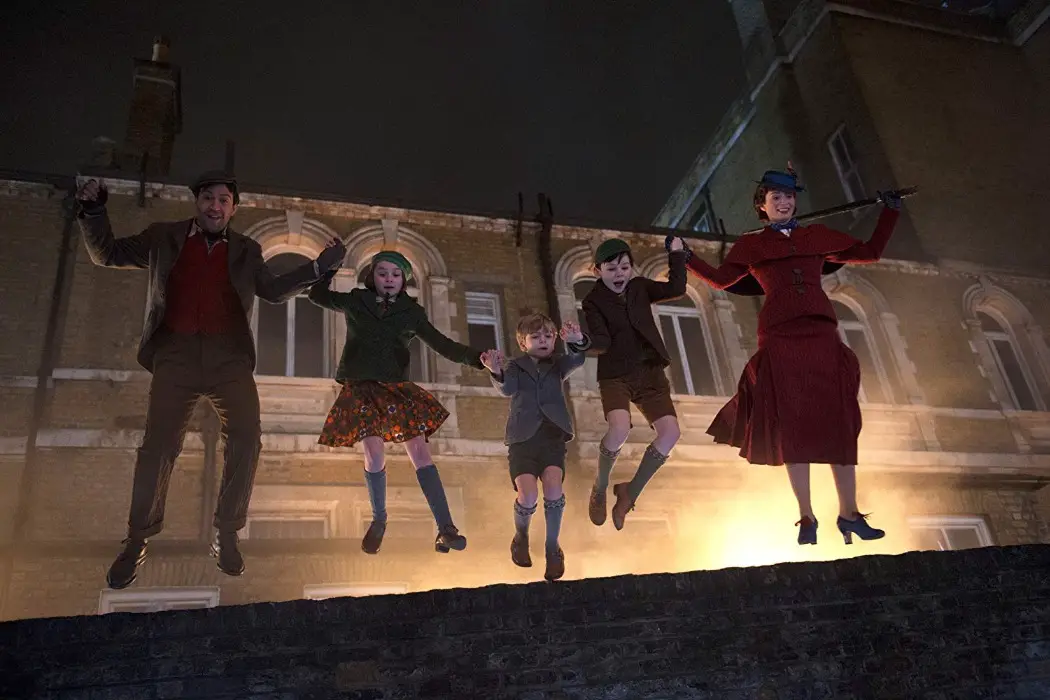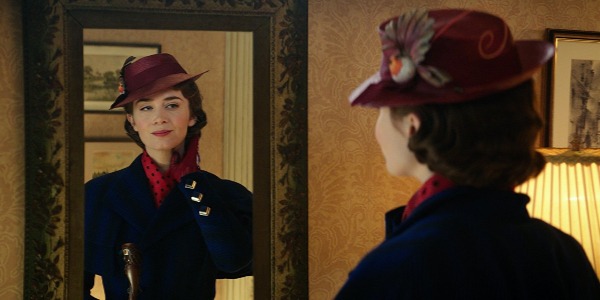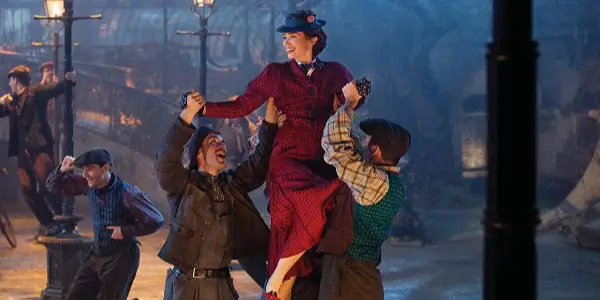MARY POPPINS RETURNS: Another Uninspired Disney Cash-in

Alistair is a 25 year old writer based in Cambridge.…
Following the one two punch of Brexit and the election of Donald Trump, cultural critics across the western world lazily predicted that society may be worse as a result, but at least we’ll have challenging new works of art, and maybe even a renaissance of punk, to protest against them. Fast forward two years, and Mary Poppins Returns has been initially greeted by critics as the movie we need right now.
There is nothing particularly wrong about a family film masquerading as an escapist venture for a troubled culture – but there is something troubling about one with no deeper messages being defined by many as the one precisely needed in this moment.
A beat for beat rehash of the original
Because assessed on its own terms, Mary Poppins Returns is not only a film we don’t “need right now”, but a deeply unnecessary sequel to a beloved classic. Toning down the endearing strangeness of its 1964 predecessor, director Rob Marshall has crafted a thoroughly pedestrian work of fan fiction that manages to do the impossible: make the otherworldly magic of its titular character feel boring. On a broader narrative level, this is a beat for beat retread of the previous Poppins outing, appearing like the rare Disney sequel on the surface, only to reveal itself as the same lazy remake that the studio has become accustomed to making in recent years.
Picking up twenty years after the Banks family met Poppins, we are reintroduced to the now grown up siblings Michael Banks (Ben Whishaw) and Jane Banks (Emily Mortimer), in the midst of a financial crisis. Michael no longer has the money to keep up payments for the family home after the death of his wife, with his sister now helping him stay afloat – although this doesn’t solve the problem of finding a nanny for his mischievous children Annabel (Pixie Davies), Georgie (Joel Dawson) and John (Nathanael Saleh).

Then, just like before, Mary Poppins (Emily Blunt) descends from the skies to offer her services to the Banks family, but as they retreat into magical escapism, Michael sees himself turning into his own father and growing increasingly irritated with their childlike wonder – especially as it’s starting to interfere with his job at the bank, his only hope of saving the family home.
The delightful eccentricities of Robert Stevenson’s original film have been toned down to the point of normalcy, exposing a key flaw with the character of Poppins that wasn’t previously apparent. As she increasingly becomes a peripheral presence to her own narrative, it becomes easier to argue that P.L Travers’ creation may have been the original manic pixie dream girl.
After all, in this iteration she doesn’t really have any agency of her own, let alone a personality, outside of making sure the children behave. The lack of explanation for her magical powers, a running joke within the franchise, here just feels like a perfect descriptor as to why she’s such an empty shell of a character – she’s beloved by everybody because she can bring joy and magic into their life, but we never find out more about her other than the sense of purpose she brings to others.
Mary Poppins: the most uninteresting thing in her own film
She exists within this narrative to help others find their purpose, with all additional personality rendered irrelevant, and therefore undisclosed to the audience. In the first film it gave Poppins some mystique – here, it just renders her so uninteresting, we have to rely on personal testimonies from other people to understand why we should be fascinated by her.
Which is why it’s so disheartening to find people genuinely enthralled by Emily Blunt’s performance, and eager to see her umbrella fly her all the way into the Best Actress Oscar lineup. This isn’t a slight on Blunt, who does the best she can at the daunting job of stepping into Julie Andrews’ shoes with such uninteresting material to work with. But it is a slight on voting critics who have decided to overlook the plethora of meaty roles for women this year to award a film that has forgot to make its titular character an actual character.
There are some pleasures to be had. Ben Whishaw’s performance is of a piece (although critically, far superior) to Ewan McGregor’s turn in Disney’s Christopher Robin earlier this year. Both are about men looking back on the magic of their childhood, passing their beloved icons down to their children, although Mary Poppins Returns has the slight edge due to sidestepping the miserabilist, existential themes so surprisingly rife in that film.

In a film of polished musical numbers and sleek dance routines, taking us from animated worlds to Meryl Streep’s upside down living room, it’s telling Whishaw steals the show barely ten minutes in, with a stripped down, half-spoken number about his wife and family. Everybody in the film is so caught under Poppins’ spell, Michael Banks feels like the only flesh and blood character as a result – and Whishaw’s performance helps compensate for the emotional vacancy elsewhere.
And although Rob Marshall may remain a fairly uninspired director, he can still make moments of visual grandeur deserving of a better film around them. When Poppins, Jack (Lin-Manuel Miranda, doing his best bad c*ckney accent) and the children disappear into a China plate in their bedroom, we’re treated to a near half hour hybrid of hand drawn animation and live action, that puts the similar sequence in the original film to shame.
As you can tell from the nature of the setpiece, Returns is following the formula of its predecessor beat for beat – this is the only moment where it captures the imagination of the original for itself, honouring the film’s history while creating something delightfully odd in the process. I mean, who could have expected the soundtrack to this movie to feature Lin-Manuel Miranda rapping in a terrible, yet strangely endearing, c*ckney accent?
Mary Poppins Returns: Conclusion
But overall, Mary Poppins Returns is the uninspired cash-in that Disney has become synonymous with. There are brief moments of magic, but you’ll still be left wishing that you were spending your time with Julie Andrews, Dick Van Dyke, and some of the best songs in the Disney catalogue. And if you’re still adamant on watching a London set family film sequel starring Ben Whishaw this festive season, it’s best advised you gather around the TV and put on Paddington 2 instead.
Mary Poppins Returns hits US cinemas on December 19, and UK cinemas on December 21. All international release dates are here.
Does content like this matter to you?
Become a Member and support film journalism. Unlock access to all of Film Inquiry`s great articles. Join a community of like-minded readers who are passionate about cinema - get access to our private members Network, give back to independent filmmakers, and more.
Alistair is a 25 year old writer based in Cambridge. He has been writing about film since the start of 2014, and in addition to Film Inquiry, regularly contributes to Gay Essential and The Digital Fix, with additional bylines in Film Stories, the BFI and Vague Visages. Because of his work for Film Inquiry, he is a recognised member of GALECA, the Gay & Lesbian Entertainment Critics' Association.













